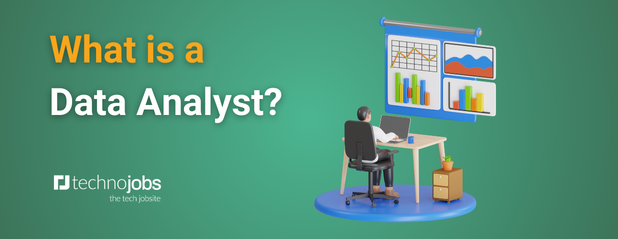What is a Data Analyst?

Data Analysts play an important role in helping organisations make decisions and optimise processes by collecting and analysing data to find patterns. Data analytics is an integral factor for companies as it allows evidence-based strategies to be created and gain a better insight into target markets and their needs.
In this article, we will look at their responsibilities, skills and salary. Read below to learn more.
What are the responsibilities of a Data Analyst?
A Data Analyst collects, organises, and reviews data to gain insights and information that can be used to make informed decisions. The different phases of data analysis usually include identifying the problem you wish to solve, collecting the raw data you need to help solve the problem, cleaning the data (this includes removing duplicates), analysing the data using different tools and techniques to find trends, then interpreting the results to see if this solves the issue.
Data Analysts will also communicate the results of their findings to colleagues and/or clients using data visualization, such as charts, diagrams, or graphs in a clear way for everyone to understand.
There are many different sectors you can go into in data analytics, for example, intelligence, business, operations research, and medical and healthcare.
What skills do you need to be a Data Analyst?
There are different routes you can go down to get into data analytics and you don’t necessarily need formal qualifications or training. However, if you don’t have any, it would be beneficial to learn some of the skills you will need to carry out the job, which you can use to work on projects with real data to develop a portfolio of your work to showcase these skills.
This might include taking data from different sources, cleaning the data, creating visualizations, and drawing insights from the data.
Some useful skills include:
- Understanding of common data analytics tools which include SQL, Microsoft Excel, Google Sheets, R, Tableau, SAS, and Microsoft Power BI
- Understanding of common programming languages including JavaScript and Python
- Effective communication
- Critical thinking and problem-solving
- Statistical analysis and mathematics
- Database management
What training and qualifications do you need to be a Data Analyst?
Even though you might be able to land a job without formal training, there are qualifications that will kick-start your data analytics career.
For example, a bachelor’s degree in related fields such as statistics, computer science, or mathematics will demonstrate that you have a statistical mind, and you understand some principles of being a Data Analyst.
You can also get certifications that show you are proficient. Some of these are Cloudera Certified Associate Data Analyst and Microsoft Certified Solutions Expert (MCSE): Data Management and Analytics.
How much do Data Analysts earn?
A Data Analysts salary can vary depending on a number of factors including location, experience, and skills.
- The average salary for a Junior Data Analyst is £26,000 per year.
- The average salary for a Mid-level Data Analyst is £37,000 per year.
- The average salary for a Senior Data Analyst is £55,000 per year.
What are the career progression opportunities for Data Analysts?
Data analytics can be a very secure and rewarding career with many opportunities.
Some career paths include:
The roles of a Senior Data Analyst and a Data Analyst are similar; you will still be collecting, organising, and reviewing data to gain insights; however, they will have more responsibilities.
They are likely to be more involved with the stakeholders and have more advanced statistical analysis, data mining and predictive modelling skills.
The most common programming language that senior data analysts must understand is Python and it is sometimes preferred that the individual has a bachelor’s degree in either computer science, statistics, data analytics, economics, or a related field
A Data Scientist is in charge of writing complex algorithms and computer programming. As opposed to a Data Analyst who looks at data through routine analysis, Data Scientists work on new ways to capture, store, and analyse the data and create automation tools that reduce routine work.
Some soft skills for this role are critical thinking, innovative problem solving and effective communication.
A Business Analyst is focused on creating and interpreting reports on how a business is operating on a daily basis, suggesting recommendations based on these findings and sharing them with the stakeholders.
They are more focused on helping businesses reach their goals and increase their customers and profits than Data Analysts who are more responsible for analysing complex datasets to identify patterns and trends.
Skilled Data Analysts are highly sought-after, and this doesn’t appear to be changing any time soon. So, no matter what path you later want to go down, having data analysis skills will give you a secure and enjoyable career.
Find all Data Analyst jobs here

